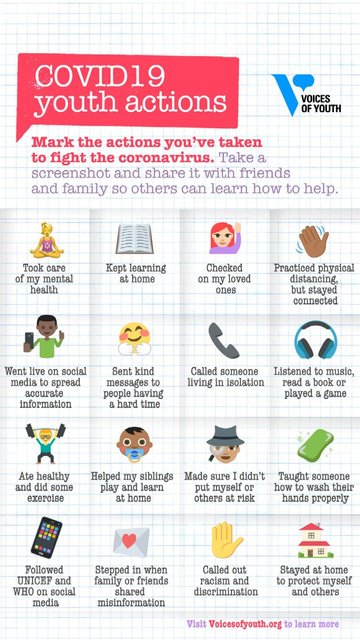How adolescents and youth can help fighting COVID-19?
All around the world, people are taking necessary steps to protect themselves and their families from the new coronavirus disease (COVID-19), to support their communities, and prevent the spread of the outbreak. And your help matters. We know that you are passionate about making the world a better place for children. Many of you are probably already taking action to prevent the spread of COVID-19. Inspired by the actions of young people across the world we’ve put together a set of actions that anyone can take to join the fight against misinformation and stigma, and to promote community support and spirit.
Important reminders before you start:
Health first: do not put yourself at risk in any way. Make sure you follow local guidance regarding the types of activities that are permitted during the outbreak. Mental health self-care is essential – take care of yourself, and if you are able to, help support others. If you’re feeling overwhelmed, anxious or worried, first know that you are not alone. Find someone you can talk to about how you are feeling – find a family member, a friend, a colleague, a counselor or anyone you feel comfortable reaching out to and speaking with.
Online safety : if people online become aggressive do not engage with them. Do not talk to them, block them and report them if necessary.
It’s okay to be unsure: if someone asks you a question about COVID-19 and you’re not sure, don’t guess. Say that you don’t know and for updates and information about coronavirus in Sierra Leone, please visit the websites for Government of Sierra Leone Ministry of Health and Sanitation Directorate of Health Security and Emergencies (www.dhse.gov.sl) and Ministry of Information and Communications (www.mic.gov.sl).
Don’t keep it to yourself: if you are worried about something that has happened or that you have seen, do not keep it to yourself. Tell an adult you trust.
THINGS YOU CAN DO DURING COVID-19 TIME:
- TALK TO YOUR FAMILY: Make sure that all your family members know the importance of handwashing and hygiene, physical distancing and where to find the latest, most reliable information. Set up a family meeting to discuss this with them. If you have family who don’t live with you or don’t have regular access to reliable news sources, pick up the phone and give them a call. This is especially true of grandparents (people over 70) and others who are more vulnerable.
- HELP WITH LEARNING & PLAY: Find out if you can help younger siblings or family members with learning and play activities if their schools have closed.
- STUDY HOME: If your school or university has closed, study with Radio Teaching Program or read your schoolbooks and if there is anything that you don’t understand, ask your older siblings or friends to explain to you. Also, you can go back and practice what you have learnt so far in previous semester.
- DO A TUTORIAL: If you have a skill or a hobby that you can do safely from home (dancing, cooking, poetry, fitness, art) you can also share that with friends online or show to your family members to brighten up their day - and yours.
- MARK THE ACTIONS YOU’VE TAKEN TO FIGHT THE CORONAVIRUS: Write down in your notebook or take pictures of the actions you’ve taken to fight the coronavirus, so you can share them with your family and with your friends when you’ll be back at school.
Here is the list of the actions you've taken to fight the coronavirus that you can mark.

Average Rating: ☆ ☆ ☆ ☆ ☆ (0 reviews)

